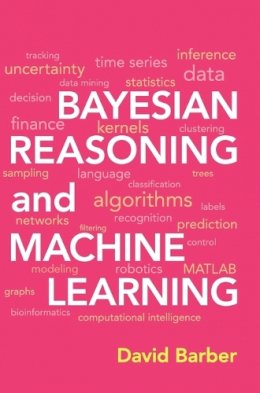
Stock image for illustration purposes only - book cover, edition or condition may vary.
Bayesian Reasoning and Machine Learning
David Barber
€ 85.89
FREE Delivery in Ireland
Description for Bayesian Reasoning and Machine Learning
hardcover. A practical introduction perfect for final-year undergraduate and graduate students without a solid background in linear algebra and calculus. Num Pages: 720 pages, 287 b/w illus. 1 table 260 exercises. BIC Classification: PBT; UYQM. Category: (P) Professional & Vocational; (U) Tertiary Education (US: College). Dimension: 247 x 195 x 38. Weight in Grams: 1698. 728 pages, 287 b/w illus. 1 table 260 exercises. A practical introduction perfect for final-year undergraduate and graduate students without a solid background in linear algebra and calculus. Cateogry: (P) Professional & Vocational; (U) Tertiary Education (US: College). BIC Classification: PBT; UYQM. Dimension: 247 x 195 x 38. Weight: 1730.
Machine learning methods extract value from vast data sets quickly and with modest resources. They are established tools in a wide range of industrial applications, including search engines, DNA sequencing, stock market analysis, and robot locomotion, and their use is spreading rapidly. People who know the methods have their choice of rewarding jobs. This hands-on text opens these opportunities to computer science students with modest mathematical backgrounds. It is designed for final-year undergraduates and master's students with limited background in linear algebra and calculus. Comprehensive and coherent, it develops everything from basic reasoning to advanced techniques within the framework of graphical models. Students learn more than a menu of techniques, they develop analytical and problem-solving skills that equip them for the real world. Numerous examples and exercises, both computer based and theoretical, are included in every chapter. Resources for students and instructors, including a MATLAB toolbox, are available online.
Product Details
Publisher
Cambridge University Press
Number of pages
708
Format
Hardback
Publication date
2012
Condition
New
Number of Pages
735
Place of Publication
Cambridge, United Kingdom
ISBN
9780521518147
SKU
V9780521518147
Shipping Time
Usually ships in 4 to 8 working days
Ref
99-1
About David Barber
David Barber is Reader in Information Processing in the Department of Computer Science, University College London.
Reviews for Bayesian Reasoning and Machine Learning
'This book is an exciting addition to the literature on machine learning and graphical models. What makes it unique and interesting is that it provides a unified treatment of machine learning and related fields through graphical models, a framework of growing importance and popularity. Another feature of this book lies in its smooth transition from traditional artificial intelligence to modern machine learning. The book is well-written and truly pleasant to read. I believe that it will appeal to students and researchers with or without a solid mathematical background.' Zheng-Hua Tan, Aalborg University, Denmark 'With approachable text, examples, exercises, guidelines for teachers, a MATLAB toolbox and an accompanying website, Bayesian Reasoning and Machine Learning by David Barber provides everything needed for your machine learning course. Only students not included.' Jaakko Hollmén, Aalto University 'The chapters on graphical models form one of the clearest and most concise presentations I have seen … The exposition throughout uses numerous diagrams and examples, and the book comes with an extensive software toolbox - these will be immensely helpful for students and educators. It's also a great resource for self-study.' Arindam Banerjee, University of Minnesota 'I repeatedly get unsolicited comments from my students that the contents of this book have been very valuable in developing their understanding of machine learning … My students praise this book because it is both coherent and practical, and because it makes fewer assumptions regarding the reader's statistical knowledge and confidence than many books in the field.' Amos Storkey, University of Edinburgh
